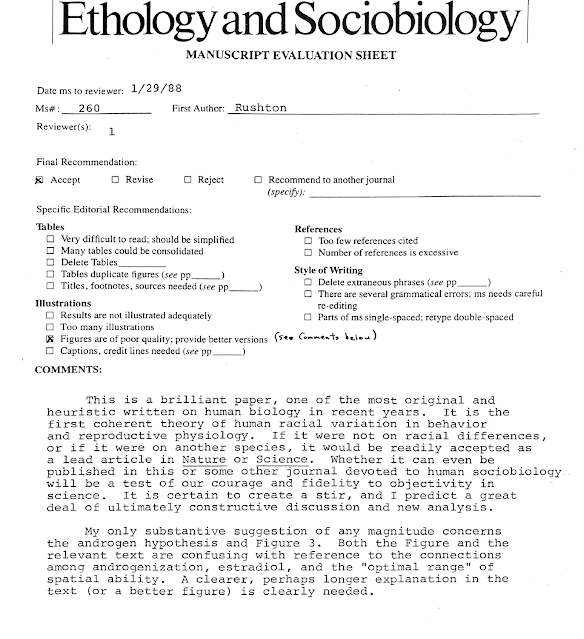Great review of Kathryn Paige Harden's book "The Genetic Lottery" in the New York Review of Books: Why Biology is not Destiny by M.W. Feldman and Jessica Riskin.
You can tell Harden is a complete hereditarian, in spite of her denial, by the way rightwing racist political operative Razib Khan likes to promote her work.
The entire piece is what good science writing should be, unlike the garbage written by Steve Sailer (and promoted by Steven Pinker) or the ineptitude of Khan. It holds together cohesively by playing off the "frog boiling" metaphor used by Harden herself.
It begins:
You must know the parable about the frog that sits in a pot of water being gradually heated, allowing itself to be boiled alive: because the change happens gradually, it never realizes it should leap out. Reading Kathryn Paige Harden’s book The Genetic Lottery: Why DNA Matters for Social Equality is a similar experience, as the author ingenuously points out. “Like a frog being slowly boiled alive,” she observes, readers follow her argument “from an uncontroversial premise to a highly controversial one.”
Continues
Harden is a dedicated frog boiler. She introduces many comfortably room-temperature premises: measurement is essential to science; people differ genetically; genes cause conditions such as deafness; a recipe for lemon chicken produces variable results but never leads to chocolate-chip cookies. Lulled to complacency by such anodyne and often homey observations, we soon find ourselves in a rolling boil of controversial claims: genes make you more or less intelligent, wealthier or poorer; every kind of inequality has a genetic basis.
And concludes:
Back finally to frog boiling: this practice, it turns out, is directly, not just metaphorically, related to arguments for a biological hierarchy of intelligence. The first experiments testing the reflexes of frogs in gradually heated water took place in the mid-nineteenth century, around the same time as the first theories of the biological basis of intelligence. Experimenters also lobotomized frogs, severed their spinal cords, heated and chilled their brains, and subjected them to strychnine poisoning, among other forms of torture, to see how these affected their reflex responses. Spencer cited these experiments in support of his theory that intelligence arose by infinitesimal degrees from the rudimentary reflexes of lower animals, through higher animals, “the inferior human races,” “the villager,” and “the man of ordinary education,” to “the advanced man of science”—i.e., Spencer himself.
Harden was right to compare her reasoning to the reasoning of the frog boilers. Both the logic and the experimental program of frog boiling exemplify the essentialist tradition in which she is a participant. But the theory doesn’t hold up in experiments: the frog, if intact and in a vessel it can escape, will actually jump out rather than be boiled alive. Our message to you, reader, is accordingly simple: jump out.
Beautiful literary styling combined with excellent logic and science points unencumbered by technical terms that only statisticians can understand:
Among other phenotypes associated with “educational attainment” for which Harden cites genome studies are “grit,” “growth mindset,” “intellectual curiosity,” “mastery orientation,” “self-concept,” “test motivation,” and especially “a trait called Openness to Experience, which captures being curious, eager to learn, and open to novel experiences.” Harden doesn’t reveal just who calls this important trait “Openness to Experience” or how they measure it. Surely, there must be disagreement among researchers about what constitutes this phenotype or others in the list, such as “grit.” More so, at any rate, than about what constitutes macular degeneration.
Explaining how social scientists make genome-wide association studies and polygenic scores, Harden writes:
Correlations between individual SNPs and a phenotype are estimated in a “Discovery GWAS” with a large sample size…. Then, a new person’s DNA is measured. The number of minor alleles (0, 1, or 2) in this individual’s genome is counted for each SNP, and this number is weighted by the GWAS estimate of the correlation between the SNP and the phenotype, yielding a polygenic index.
This alphabet soup in the passive voice implies that no one actively does all this estimating, measuring, counting, weighting, correlating—or that these are such technical processes that any human presence in them is irrelevant. But people are making interpretive decisions at every stage: how to define a phenotype and select people to represent it, how to count these people, which single-nucleotide polymorphisms to consider, how to weight and aggregate them. Interpretive decisions are of course essential to all science, but here there are a great many opinions dressed up in facts’ clothing.
Including this fascinating bit, a possible explanation for why so many find "heritability" so hard to express in plain language and always resort to statistics-talk:
The confusion between correlation and causation in fact first arose in connection with arguments for the biological, hereditary basis of intelligence. The mathematical concept of correlation—a measure of the degree to which two variables are associated—came into existence as a linchpin of the conjoined sciences of statistics and eugenics in the 1880s. Galton developed fundamental concepts of statistics, including correlation, deviation, and regression, to provide the mathematical basis for a new “science of improving stock,” for which he coined the term “eugenics.” This mathematics of heredity, Galton believed, revealed evolutionary patterns in “human qualities and faculties”—for example that they naturally followed a “normal distribution,” or bell-shaped curve.
And most important to the mission of this blog, Harden's support for race pseudoscience, which makes her work the darling of racists, which is either sneaky or feckless, depending on how deliberate Harden's weasel words are:
Having distinguished genetic ancestry from race, however, Harden continually elides the two, as when she says that genomic research has so far been based almost entirely on “people whose recent genetic ancestry is exclusively European and who are overwhelmingly likely to identify as White.” Harden mentions this fact about genomic research in order to explain that her claims about the genetic basis of differences in intelligence apply only to differences among white-identifying people rather than to differences between whites as a group and people of other racial identities.
Here again Harden echoes her predecessors: Galton wrote in 1869, “The range of mental power between—I will not say the highest Caucasian and the lowest savage—but between the greatest and least of English intellects, is enormous.” Social class, as much as race, provided the focus of Galton’s eugenic writings; he too argued for an innate biological hierarchy of intelligence among white people. Harden’s assertion that “genetics can be causes of stratification in society” accords well with Galton’s view that social classes were based in biology.
Regarding race, Harden’s message is to relax: She has nothing to say about genetics and intelligence in nonwhite people, so how can her argument have racist implications? Moreover, she writes that the genome studies of white people will likely not be “portable” to other races, which will differ in frequencies and co-occurrences of genetic variants, precluding interracial comparisons based on such studies. What happened to the idea that races aren’t natural kinds? Once again Harden elides the crucial distinction between genetic populations and races when she writes that genome studies will probably not apply across “genetic ancestries or socially defined races.” Her use of italics seems to emphasize a distinction between ancestry and race, yet she continually treats them as equivalent, offering no explanation for why race would pose a significant barrier to applying genome study results across populations defined by genetic ancestry.
I had hoped that Adam Rutherford or Eric Turkheimer would have written this kind of response but wonder if their affection for Harden has prevented them from doing so. I understand they are both busy but the book was published last September.
When I saw this review I tried to share it with Harden on Twitter, only to discover she had blocked me, probably for disagreeing with her claim she's not an hereditarian. I have found that blocking is the standard way that hereditarians deal with critics.












